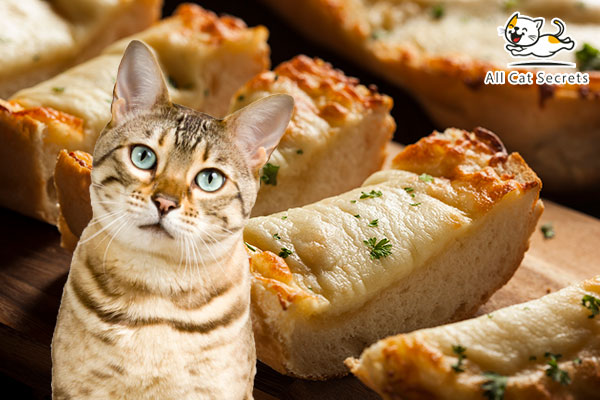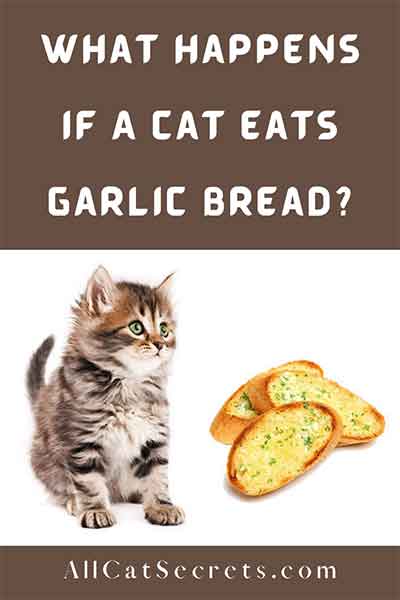Bread is not a staple ingredient in most cat foods. That’s mainly because bread contains plant-based compounds. Note that cats are obligate carnivores, which implies that their stomachs are more adapted to digesting animal protein as opposed to plant-derived products.
However, a small amount of bread served occasionally is perfectly okay (even if not very nutritious) for cats. In fact, cats are generally drawn to bread, probably because the food is a common sight in many homes around the world.
Now that bread isn’t inherently toxic to cats, can cats eat garlic bread?
Absolutely not. Bread made from pure wheat may not be immediately harmful to cats. But throwing garlic into the mix changes the equation dramatically. Garlic is classified among the most toxic herbs for cats. The same is true for other members of the Allium family, such as onions and leeks.
So, can cats have garlic bread?
Cats shouldn’t have garlic bread. That’s because garlic is considered highly toxic to cats and many other small pets. No matter how curious your feline friend gets whenever he catches you snacking on garlic bread, you should always resist the urge to share this food with the animal.
But as you shall find later on, the problem with garlic bread isn’t just about the garlic seasoning. The bread is normally garnished with a host of other ingredients that could harm your cat. Even the wheat itself isn’t entirely risk-free.
Table of Contents
Understanding Garlic Bread
One of the frequently asked questions among cat owners who love to snack on garlic bread is, ‘is garlic bread safe for cats?’
Garlic provides numerous health benefits for humans. The spice is most noted for its powerful antioxidant and anti-inflammatory properties. However, garlic also ranks among the most toxic herbs for cats. Even a teeny-tiny amount of garlic-containing foods like garlic bread could trigger severe side effects for your feline friend.
But before we examine the potential risks of garlic bread for cats in detail, it’s best to understand more about this food.
Now, garlic bread (also known as garlic toast) is bread that’s typically topped with garlic, butter, and olive oil. The bread may also include other herbs, such as chives and oregano.
Garlic bread is typically prepared by grilling until its toasted. It may also be baked in a conventional way as regular bread.
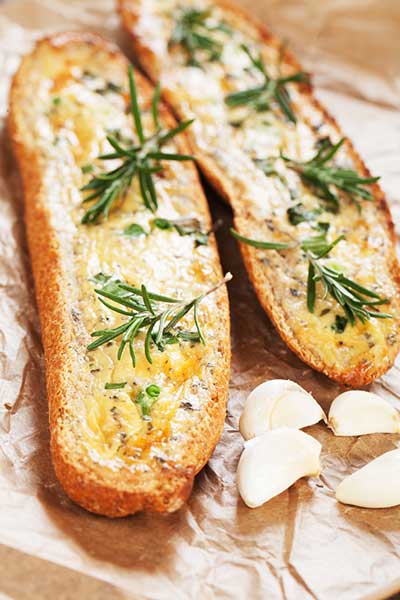
What Happens If A Cat Eats Garlic Bread?
Garlic bread can trigger a host of adverse effects in cats. Nearly all the ingredients in the food present a degree of harm to your kitto.
However, the negative effects of garlic bread for cats depend on the specific ingredients the bread contains. The following are some of those compounds;
1. Garlic
Garlic is the biggest problem with garlic bread for cats. What complicates the situation even further is the fact that this herb is one of the basic ingredients in garlic bread.
The potential toxicity of garlic for cats comes from compounds known as thiosulfates and disulfides. These chemicals have been shown to cause organ failure in cats if ingested.
Without urgent medical intervention, thiosulfates and disulfides may kill your cat. And in most cases, single garlic clove is all it takes to induce poisoning.
But just how does garlic affect your cat?
When ingested, garlic enters your cat’s bloodstream and immediately starts to break down the animal’s red blood cells. The continued rupturing of red blood cells may result in a life-threatening illness known as hemolytic anemia.
Garlic poisoning may not trigger hemolytic anemia immediately. It might take up to five days for an exposed cat to begin presenting any symptoms. By this time, the animal’s red blood cells usually have already taken some beating.
- CONTAINS: This pack of Delectables Squeeze Ups contains 32 (0.5 ounce eaches) squeezable cat treat tubes.
- INTERACTIVE TREATING: Squeeze Ups provide the purrfect bonding experience between you and your cat – this playful & interactive...
- PUREE TREATS: Each lickable treat tube is stuffed with a thick and creamy puree treat that is made from real poultry and fish.
Last update on 2024-07-23 / Affiliate links / Images from Amazon Product Advertising API
Common symptoms of hemolytic anemia include;
- Vomiting
- Appetite loss
- Diarrhea
- Abdominal discomfort
- Pale gums
- Jaundice or yellowing of the skin
- Discolored urine, which may appear red or brown
- Labored breathing
- Elevated heart rate
- Drooling or hypersalivation
- Fatigue
- Ataxia – lack of muscle coordination
- Altered levels of consciousness
The severity of effects will depend on several factors, such as your cat’s age, body weight, general health, and breed type. But if untreated, your feline friend could succumb to hemolytic anemia in a matter of days.
2. Wheat
Wheat is less toxic to cats than garlic. In fact, cats can safely consume raw wheat in moderation. Most cat foods actually contain wheat (NOT BREAD) and several other grains, including corn, rice, oats, and barley.
However, wheat isn’t completely risk-free. Excess raw wheat intake could induce severe stomach upset in cats.
Wheat may also trigger an allergy in some cats.
Allergic reactions from wheat consumption mainly result from the gluten protein found in the grain. However, it can also be caused by the flour itself.
The signs of allergic reactions to wheat in cats are mainly gastrointestinal, such as vomiting, diarrhea, and abdominal pain. Some cats may also exhibit respiratory symptoms like sneezing, wheezing, and labored breathing.
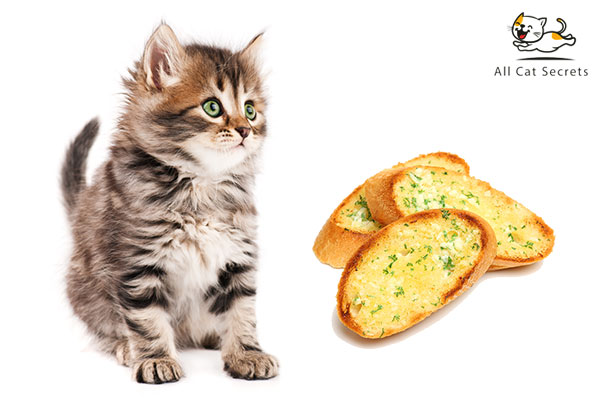
3. Yeast
Yeast and wheat often go hand in hand, especially if viewed in terms of fermented bread. According to vets, the yeast contained in small amounts of raw bread is more than enough to produce alcohol and carbon dioxide, which could cause severe medical problems for cats.
If swallowed, yeast may continue to ferment in your cat’s stomach the same way it does to bread on the counter. The continued fermentation can cause bloating, excruciating abdominal pain, and other gastrointestinal symptoms like vomiting and diarrhea.
In severe cases, surgery may be required to retrieve dough mass from a cat’s stomach.
Intoxication is another common problem with yeast for cats. Note that yeast fermentation produces ethanol as a by-product.
If absorbed into your cat’s bloodstream, ethanol may cause alcohol toxicosis by inducing metabolic acidosis. Metabolic acidosis is a condition in which the blood gets oversaturated with acids to an extent that it alters the body’s chemical profile.
4. Butter
Butter is infamous for its high fat content. Fatty foods can trigger all manner of medical conditions in cats.
Fat is the leading cause of weight gain in cats and humans alike. Feeding excess amounts of garlic bread to your cat may trigger obesity and overweight.
Fatty foods like garlic bread may also increase the risks or worsen the symptoms of certain lifestyle conditions like pancreatitis, diabetes, and heart disease.
5. Olive Oil
Olive oil, just like garlic, is rich in essential nutrients and powerful antioxidants. But that’s as far as human consumption is concerned.
Cats should never consume olive oil.
Olive oil presents the same health risks as butter and other fatty ingredients in garlic bread. The olive can induce unintentional weight gain in cats, in addition to increasing the animal’s risks of developing various chronic illnesses.
Olive oil is also known to cause a laxative effect in cats. Just a few drops of the oil can wreak havoc in your cat’s stomach, resulting in severe bouts of vomiting and/or diarrhea.
- Cats Lose Their Cool: Your cat can’t wait to get their paws on these irresistible cat treats that are crunchy on the outside and...
- Under 2 Calories Per Treat: Feel good about rewarding your cat every day because each crunchy cat treat is under 2 calories and...
- 100% Complete and Balanced For Adult Cats: Feel great about treating your phenomenal feline with a cat treat that’s 100%...
Last update on 2024-07-24 / Affiliate links / Images from Amazon Product Advertising API
Is Garlic Bread Bad for Cats?
Most human foods are beneficial to pets in moderation but harmful if fed in excess. However, garlic bread is an exception to this rule.
Garlic bread has no known health benefits for cats. On the contrary, numerous authority publications you’ll come across discourage feeding this bread to cats.
So, whichever way you look at it, cats should not consume garlic bread.
Can Garlic Bread Kill Cats?
Garlic bread contains several ingredients considered potentially toxic to cats, ranging from garlic to olive oil, butter, yeast, and even the wheat itself. The side effects resulting from ingesting these ingredients can be life-threatening.
Without urgent medical intervention, your feline friend may succumb to the symptoms of garlic bread poisoning. Remember, it takes only a small mass of garlic bread to cause worrisome side effects in cats.
How Much Garlic Is Toxic To Cats?
There’s no standard rule on the amount of garlic that cats can safely eat. The spice is inherently toxic to cats even if consumed in small amounts.
In fact, some veterinary offices place garlic toxicity at five times stronger than onions. So, ingesting just one clove of garlic can induce a host of negative effects in cats.
Perhaps the more relevant point to emphasize here is that the side effects of garlic poisoning vary depending on several factors. Common ones include a cat’s age, body weight/breed, and health condition.
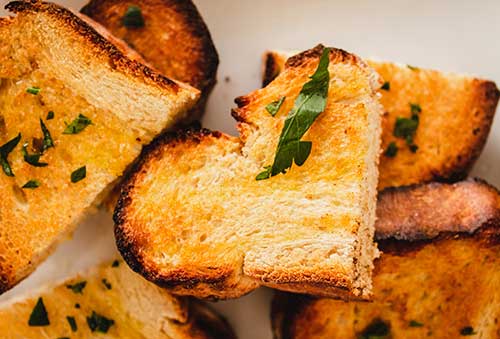
Kittens will definitely develop more severe symptoms of garlic poisoning than mature cats. That’s because of their sensitive digestive tracts.
Smaller cat breeds will also come down with garlic poisoning faster than larger breeds. A small body mass translates to a higher absorption rate. In other words, the thiosulfates and disulfides in garlic enter the bloodstream of small-bodied cats much faster than larger cats.
Lastly, cats with compromised immunity will bear the brunt of garlic poisoning compared to their healthier counterparts. So, sick cats should avoid garlic like the plague. The same is true for pregnant and nursing cats, as well as cats recovering from major surgical procedures.
What to Do If Your Cat Ate Garlic Bread
If you’re a proud cat owner who also loves garlic bread, you’ll occasionally find yourself wondering, ‘my cat ate garlic bread, will he get sick?’
Indeed, one of the common concerns pets receive from cat owners is, ‘I gave my cat a piece of garlic bread, please help!’
It’s natural to get worried if you discover that your cat ate garlic bread behind your back. No matter the amount consumed, there will always be some side effects to watch out for. Your best bet would be to book an appointment with your bet immediately.
Can Cats Lick Garlic Bread?
Garlic is more concentrated than many other members of the Allium family. So, it’s not surprising that cats are particularly drawn to foods containing this spice, such as garlic bread.
Fortunately, your cat is unlikely to suffer from any severe side effects if he only sniffs or licks garlic bread. The problem comes in if the animal goes ahead to ingest the bread.
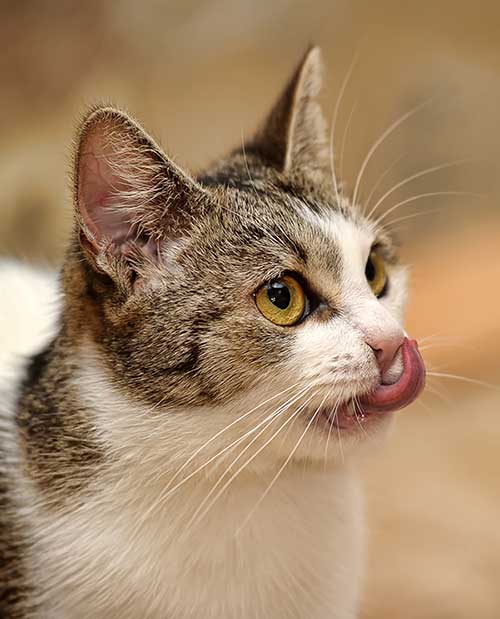
Conclusion
Garlic bread is potentially harmful to cats. Many of the health risks of garlic bread to cats come from garlic. However, all the other common ingredients in the bread, such as butter, yeast, olive oil, and wheat, could also trigger adverse reactions.
So, it’s recommended to avoid feeding garlic bread to your cat at all costs. Instead, consider healthy alternatives to garlic bread for cats, such as rice, bananas, melon, carrots, and oatmeal.
Checkout Our Favorite Cat Products
1. Best Online Course For Cat Parents
Our favorite: The Cat Language Bible (How to Finally Understand And Speak to Your Cat) – A new form of cat to human communication that many cat owners have dreamed about… but few have actually thought possible.
2. Best Immune Support For Cats
Our favorite: Tomlyn Immune Support – Best Supplement for Cats and Kittens.
3. Best Cat Treats
Our favorites: LIFE ESSENTIALS All Natural Freeze Dried Chicken And Sheba Meaty Tender Sticks – Both are Great.

